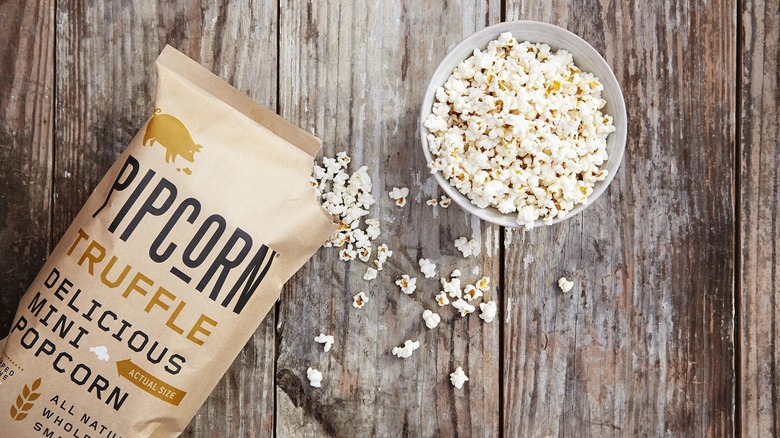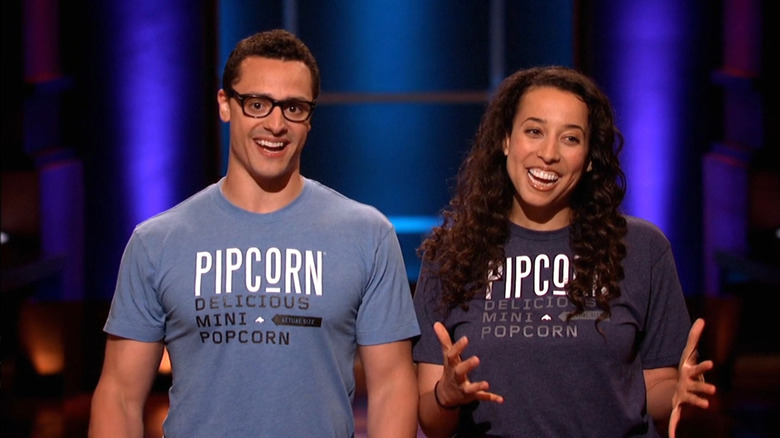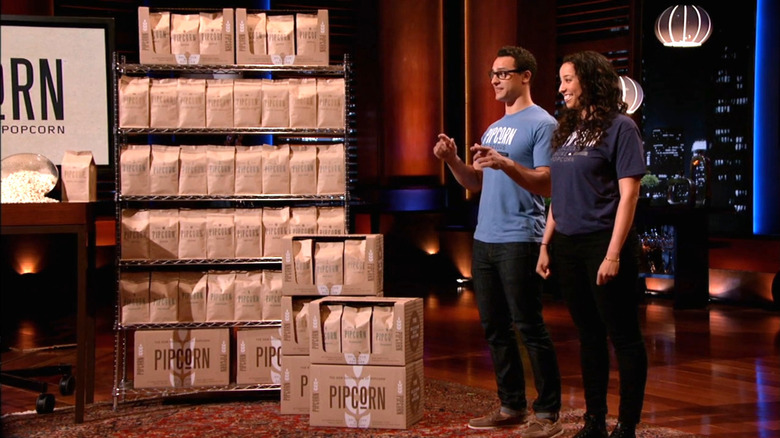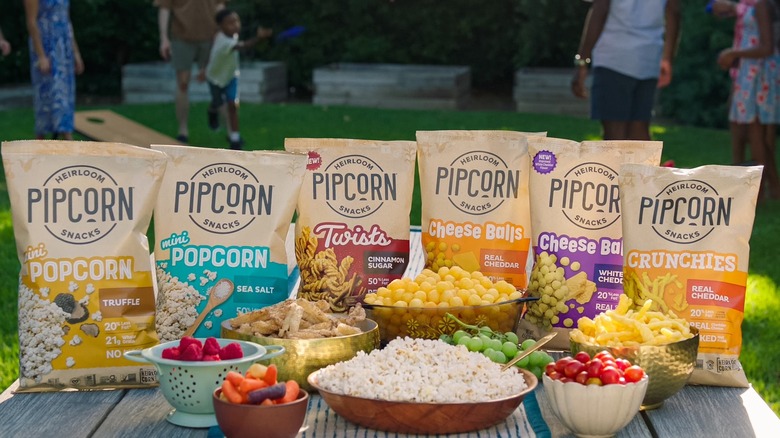Where Is Pipcorn From Shark Tank Today?
We may receive a commission on purchases made from links.
In 2012, siblings Jeff and Jennifer Martin founded a food company then called PipSnacks (now known as Pipcorn Heirloom Snacks). At the time, Jeff was helping Jennifer move when the two suddenly had a craving for a snack. They made their own popcorn using heirloom corn kernels, which they loved, especially because it didn't interact with any of Jennifer's many food allergies (including regular popcorn, which upset her stomach). So, they decided to create a business out of it, along with their third co-founder, Jeff's wife, Teresa Tsou. The siblings created different flavors sold under the Pipcorn name, and the brand became a success.
So, aside from the spelling of the product name, what sets this particular popcorn brand apart from the rest of the standard microwave varieties you'll find at your local grocery store? Aside from a dizzying array of flavors offered by the company, the corn used to make Pipcorn has very small kernels, resulting in a minuscule hull once popped, preventing it from getting caught in your teeth. On its website, Pipcorn also describes heirloom kernels as having "better taste, superior nutrition, and environmental sustainability." The product is also gluten-free and vegan.
When the siblings appeared on "Shark Tank," the snacks were distributed in 40 stores, including Whole Foods, and had already grabbed the attention of Oprah, who named Pipcorn as one of "Oprah's Favorite Things" in 2012. But the founders wanted to expand, and that's where ABC's "Shark Tank" came in, which led to Pipcorn becoming one of the show's biggest food wins.
What happened to Pipcorn on Shark Tank?
In "Shark Tank" Season 6, Episode 9, Jeff and Jennifer Martin shared the story of how their business started and passed out product samples, which the sharks seemed to like. The siblings asked for a $200,000 investment in exchange for 10% of the company.
Upon pressing from Kevin "Mr. Wonderful" O'Leary, however, they also shared details about the financial struggles they faced as growing entrepreneurs. Although their product had performed well in local stores, the burdensome costs of launching a manufacturing business had taken their toll on the pair. The two said they ate a lot of popcorn to survive, and Jennifer even admitted to moving into a friend's closet at one point.
Although it didn't earn him any friends among other sharks, O'Leary quickly backed out, stating that the company was not worth what the siblings were asking. However, Barbara Corcoran saw potential in the company. After a bit of back and forth, Corcoran said she would take the deal, adding that she wanted a 10% draw any time the siblings withdrew money from the company. Robert Herjavec even revised his original offer — $200,000 for 20% of the company — and offered what the siblings were asking for. But the Martins decided to go with Corcoran. As it turned out, Corcoran's bet paid off because the company took off after appearing on the show.
How did Pipcorn do after Shark Tank?
According to a subsequent update on "Shark Tank," the company received 12,000 orders after the episode aired, quickly creating a backlog when it came to shipping out its product. Luckily, Jeff and Jennifer Martin knew how to handle such an unprecedented increase in demand. In order to assuage concerns from customers who were unable to immediately receive their popcorn, the Martin siblings offered two incentives to keep their customers patient.
First, they gifted the longest-delayed customers 50% discounts on their initial orders and offered free shipping for second orders. As a result of the pair's quick thinking in response to the heightened demand, the company was able to substantially expand its business. Less than three months after their episode of "Shark Tank" aired, the Martins saw sales of $1.1 million, meaning their revenues increased 450%.
Pipcorn expanded to selling nationwide, with over 30,000 distribution points, including at popular retailers such as Whole Foods, Target, and Sprouts. You can also order the snacks directly from the Pipcorn website or its Amazon storefront, which was opened during the COVID-19 pandemic.
Is Pipcorn still in business?
Pipcorn isn't just still in business — it seems to be thriving. Per Shark Tank Blog, the company was earning $12 million in yearly revenue as of late 2024. Pipcorn has also expanded into the wider world of snacks. Along with popcorn, the company now sells cheese balls, crunchy fries, dippers, twists, and Cheetos-style crunchies.
There's also a variety of flavors amongst the snacks — from cinnamon sugar twists to truffle fries to jalapeño cheddar cheese balls and more. In other words, there's something for everybody. There are also several variety packs available on Amazon, so you don't have to choose just one among the many tasty flavors and varieties. And if you're curious about making your own mini popcorn, Pipcorn even sells unpopped kernels. After all, there are some excellent reasons to make popcorn on the stove. Making popcorn at home also allows you to get creative with the seasoning — you can either try to recreate one of Pipcorn's flavors or try something new.
It's likely that Pipcorn will continue to put out new, tasty products, especially since the company was recently acquired by UpSnack Brands, alongside another snack brand, Spudsy. Joe DePetrillo, the CEO of Pipcorn, expressed in a statement that he was elated with the decision. He said, "This new venture will enable continued investment in growth and fuel innovation in our future product offerings."
As for what those future product offerings will be — whether it's new products entirely or more flavor options of the existing products — we'll just have to wait and see. In the meantime, there is no shortage of Pipcorn snacks to keep you occupied.
"Shark Tank" is available for purchase on Prime Video.



